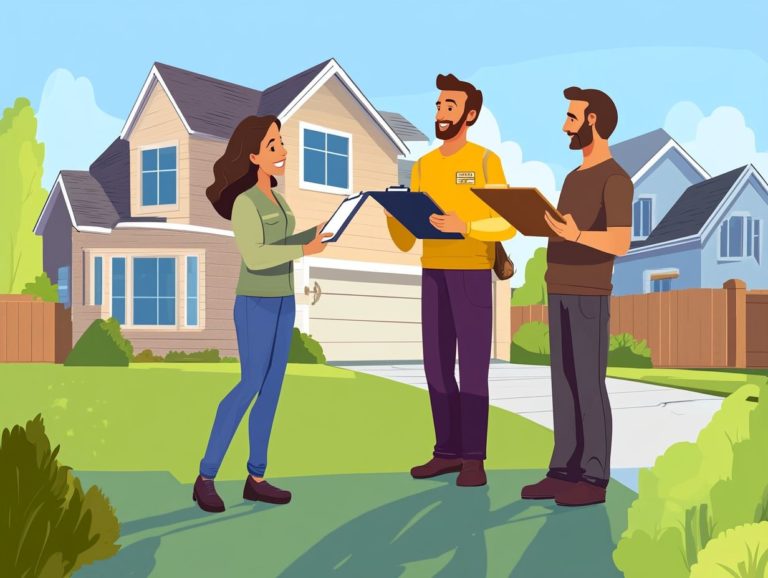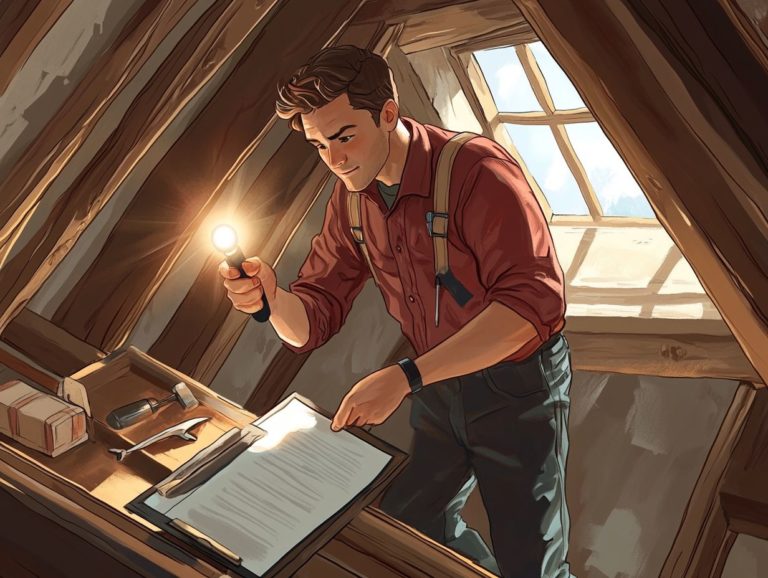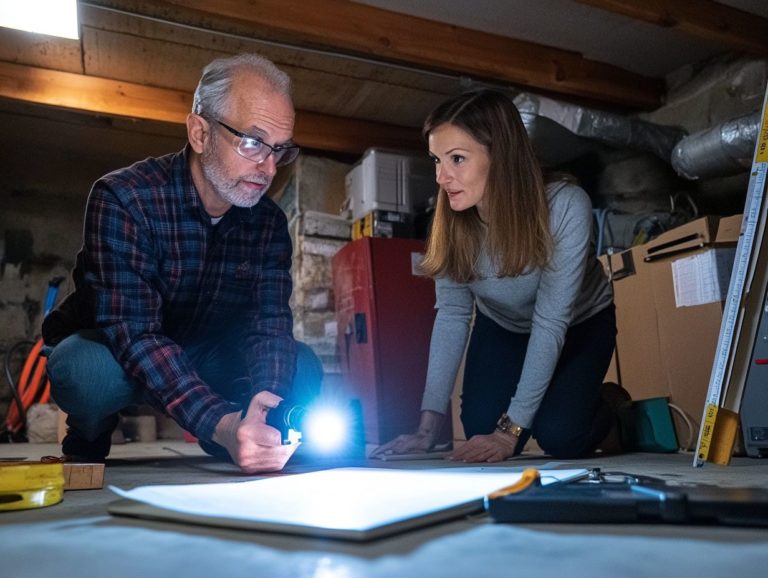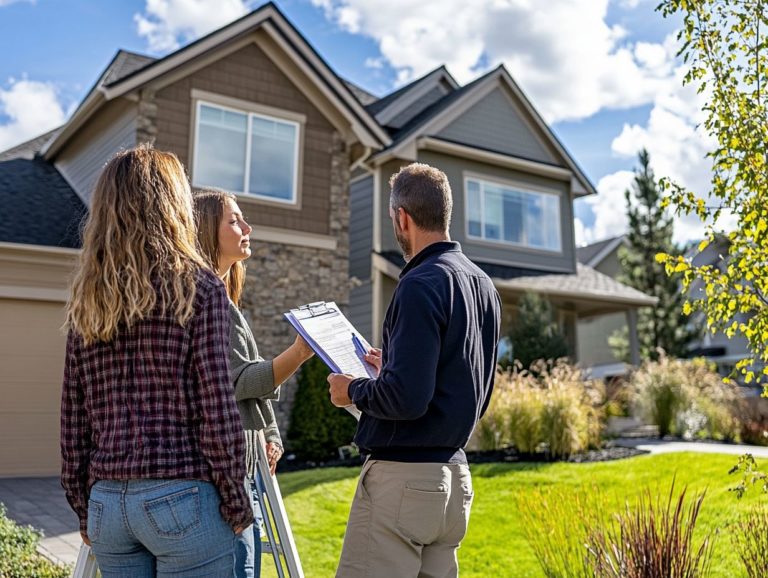How to Address Issues Found in Home Inspections
Buying a home is an exhilarating journey, but it also presents its fair share of challenges, particularly when it comes to home inspections.
Grasping what a home inspection involves is essential for ensuring that your future space is secure. This guide delves into common structural and electrical issues, along with effective ways to address them.
You’ll also find tips for negotiating with sellers and preventing potential problems down the line. Whether you’re a first-time buyer or simply seeking to refresh your knowledge, this guide will arm you with the crucial insights needed for a more seamless home-buying experience.
Contents
- Key Takeaways:
- Understanding Home Inspections
- Common Issues Found in Home Inspections
- How to Address These Issues
- Negotiating with Sellers
- Preventing Issues in Future Home Inspections
- Preguntas Frecuentes
- Qu es una inspecci n de vivienda y por qu es importante?
- Cu les son algunos problemas comunes que se encuentran en las inspecciones de vivienda?
- C mo debo abordar los problemas encontrados en una inspecci n de vivienda?
- Qu debo hacer si el vendedor se niega a abordar los problemas encontrados en la inspecci n de vivienda?
- Puedo abordar los problemas de una inspecci n de vivienda yo mismo?
- Qu debo hacer despu s de realizar las reparaciones?
Key Takeaways:

- Hire professionals for major repairs to ensure safety.
- Use the inspection report to negotiate repairs or price cuts with sellers.
- Regular maintenance prevents future issues and ensures successful inspections.
Understanding Home Inspections
Understanding home inspections is important for home buyers and sellers. These evaluations can reveal property issues that greatly influence the negotiation process and closing costs.
A thorough inspection report typically uncovers critical elements, including necessary repairs, safety concerns, and potential surface problems that may arise during your homeownership journey.
By staying informed, first-time home buyers can navigate the intricacies of the real estate market with greater ease. Use inspection findings to align with your expectations and mortgage requirements.
What is a Home Inspection?
A home inspection evaluates a property’s condition. A professional inspector checks for key elements like structural integrity and major systems.
This process usually includes detailed examinations of the roof, plumbing, electrical systems, and HVAC, ensuring that everything operates properly and safely.
For buyers, it provides reassurance about their investment. Sellers can uncover issues before listing their property on the market.
Common defects like water damage, mold, and faulty wiring can significantly impact both value and safety.
Obtaining a comprehensive inspection report is essential. It guides negotiations and enables all parties to make informed decisions as they move forward.
Common Issues Found in Home Inspections
During home inspections, you’ll likely encounter various common problems that signal underlying issues within the property. Understanding how to interpret home inspection findings is crucial, as these require your immediate attention or potentially necessitate negotiation during the home buying process.
Structural integrity, roofing concerns, and plumbing issues are frequently reported, alongside potential pitfalls related to electrical wiring, HVAC systems, and foundational stability.
It’s crucial to be aware of these potential defects, as they can profoundly influence both the safety and livability of your future home.
Structural Problems
Structural problems can pose significant challenges during a home inspection. They are often connected to foundational integrity and water damage, jeopardizing the overall safety of the property.
You might notice these issues in various forms: cracks in walls, uneven floors, or musty odors indicating hidden moisture problems.
Signs of foundation issues could include doors and windows that stick or the property noticeably sinking.
When potential buyers encounter such red flags, it raises concerns about immediate repair expenses and impacts their view of the property s long-term value.
As a result, sellers may find themselves in a precarious position during negotiations, as buyers are likely to use these structural concerns to significantly reduce their purchase offers.
Why Electrical and Plumbing Matter

Electrical and plumbing issues are very important during a home inspection. Understanding how to handle home inspection contingencies can help address these systems, which can harbor significant safety concerns and lead to costly repairs if not promptly addressed.
As a homebuyer, it s easy to overlook these critical systems. However, faults like outdated wiring or leaky pipes can result in hazardous situations, including electrical fires or water damage that can harm the structure of your home.
Miswired outlets, corroded pipes, and inadequate drainage can escalate into substantial problems. Often, this results in money problems that quickly deplete your budget.
You must act quickly to fix these issues not just for your safety but also to meet mortgage requirements that may require these problems to be addressed. For guidance on this process, consider reviewing tips on negotiating repairs after home inspection before financing is approved.
Ensuring these systems meet safety standards will provide you with peace of mind knowing your new home is safe and sound.
Roof and Foundation Concerns
Roof and foundation concerns are crucial elements of home inspections. They significantly influence the longevity and structural integrity of a property, ultimately impacting your expectations as a buyer and the market value.
When you uncover significant issues with a roof or foundation, it s natural for anxiety to creep in regarding the safety and stability of your investment. These red flags can carry substantial financial implications.
Extensive repairs may come with hefty costs, leading to negotiations that can alter final sale prices. As you weigh the necessity of these repairs against the overall property value, think about how these deficiencies might affect your long-term satisfaction with the home.
You need to know how these issues affect negotiations, so understanding the implications during this phase is vital for both you and the seller.
How to Address These Issues
Addressing the issues revealed in a home inspection calls for a carefully crafted strategy. You’ll want to blend professional assistance for essential repairs with potential DIY solutions for minor fixes. For more guidance, check out this resource on how to handle home inspection repairs.
This approach ensures that the property aligns with buyer expectations, elevating its appeal and value.
Hiring Professionals for Repairs
When you encounter significant issues outlined in the inspection report, knowing what to do after a home inspection and hiring professionals for repairs is essential to ensure that the work meets necessary standards.
This journey begins with identifying reputable contractors who have a solid track record in the specific areas that require attention. It s prudent to gather multiple repair estimates to get a sense of average market rates. This not only provides insight into potential costs but also enhances your negotiating power.
Armed with detailed quotes, you can confidently advocate for price reductions or concessions from sellers, ensuring that the work aligns with industry standards and your investment goals. This strategic approach leads to a smoother transaction and a more satisfying outcome for everyone involved.
DIY Solutions
For those minor fixes that pop up during a home inspection, opting for DIY solutions can be both cost-effective and empowering. You’ll be addressing potential buyer concerns, and knowing how to handle home inspection repairs can help you avoid racking up significant expenses.
Don t wait! Fix those small problems now to make your home shine! By tackling tasks like patching small holes in the walls, swapping out outdated fixtures, or giving key areas a fresh coat of paint, you can boost your property s appeal without straining your budget.
Common repairs, such as tightening loose cabinet hinges or fixing leaky faucets, often require nothing more than a few basic tools and a quick video tutorial. Not every home improvement needs a contractor s expertise.
That said, it s essential to weigh the benefits of DIY against the complexities of certain projects. Some repairs might be better left to the professionals to ensure quality work and compliance with local regulations.
Negotiating with Sellers
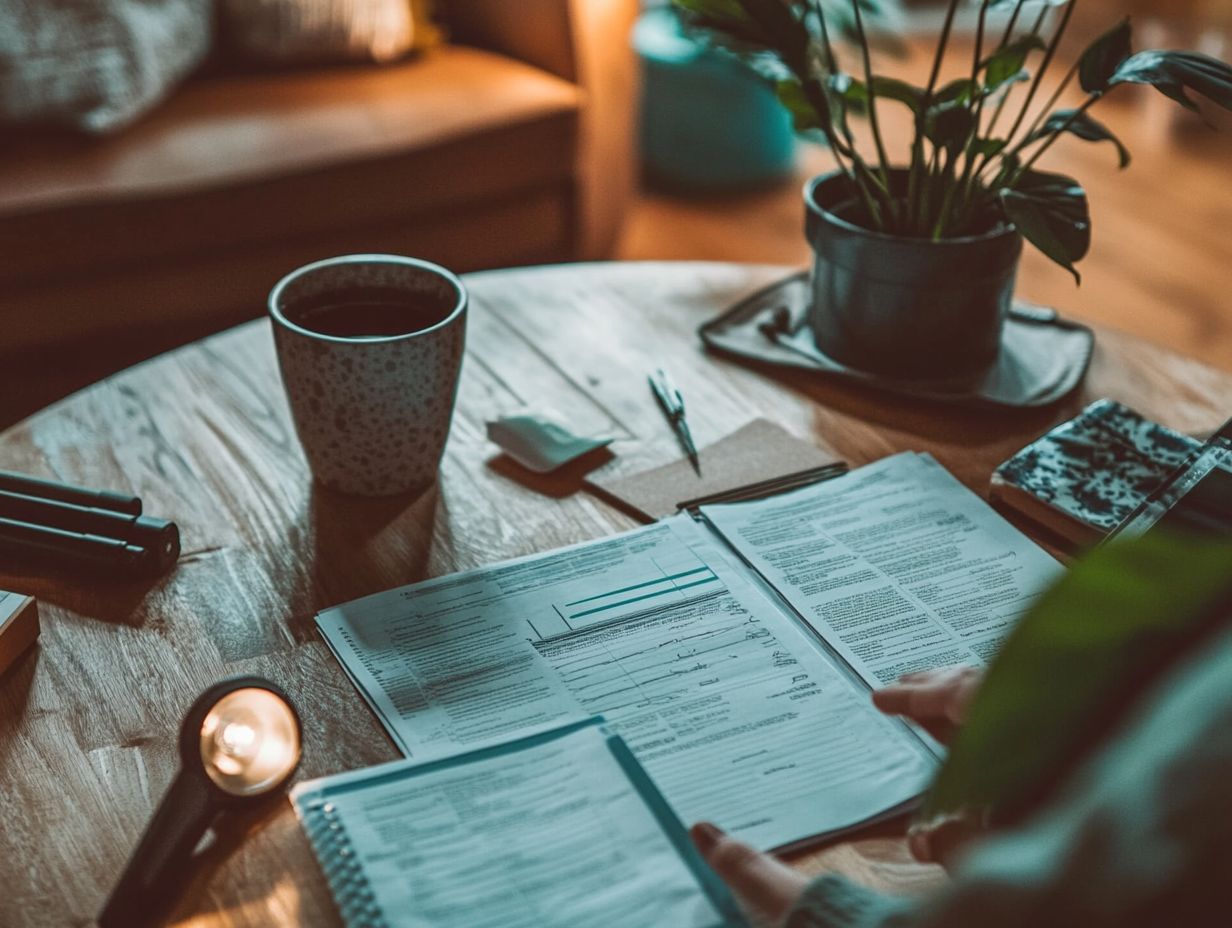
Negotiating with sellers based on the inspection report is an essential step in your home buying journey. This process enables you to leverage the findings from the inspection to secure a fair deal while effectively addressing any necessary repairs.
By doing so, you not only protect your investment but also ensure that the home meets your expectations and standards.
Using Inspection Reports to Your Advantage
Use the inspection report to strengthen your negotiation position, enabling you to clearly express what you need to the seller.
By identifying critical issues such as plumbing problems, electrical faults, or roofing concerns, you can refer to how to handle post-inspection repairs to present concrete evidence that supports your requests for repairs or price reductions.
Organize your findings into key categories to make a strong case, prioritizing major repairs first.
Incorporating visuals or supporting documents can amplify your findings’ impact when engaging with the seller.
Maintaining a respectful and collaborative tone during discussions fosters better communication, encouraging the seller to be more receptive to your proposed adjustments.
Preventing Issues in Future Home Inspections
Act now to safeguard your investment; preventing issues during future home inspections requires your proactive maintenance and keen vigilance as a homeowner. To learn more about potential problems, check out common home inspection issues.
By addressing safety concerns and property issues before they escalate, you can ensure a smooth inspection process. For guidance, check out how to deal with home inspection contingencies.
Maintaining Your Home to Avoid Problems
Consistent maintenance of your home is crucial to sidestep common property issues that can arise unexpectedly and create safety concerns during future inspections. Regular upkeep shields you from costly repairs and ensures your property remains a safe haven for you and your loved ones.
Simple tasks like inspecting your roof for loose shingles, cleaning gutters to prevent water damage, and checking smoke detectors can yield significant benefits. By promptly addressing minor issues, you cultivate a proactive maintenance routine that enhances inspection outcomes, providing you with peace of mind and potentially boosting your property value.
After all, a well-maintained home is far less likely to raise red flags during the buying or selling process.
Tips for Choosing a Quality Home Inspector
Choosing a quality home inspector is essential for obtaining comprehensive and accurate inspection reports that truly reflect the property’s condition.
When searching for a qualified inspector, look for various certifications; they are reliable indicators of training and expertise. Experience is equally important; an inspector with a solid track record is more likely to spot subtle issues that could significantly impact the property’s value.
Take the time to examine online reviews; they can offer valuable insights into the experiences of past clients, helping you assess the inspector’s reliability and thoroughness.
A thorough inspection can greatly enhance your home buying experience, illuminating potential repairs or safety concerns that could influence future costs and decisions.
Preguntas Frecuentes
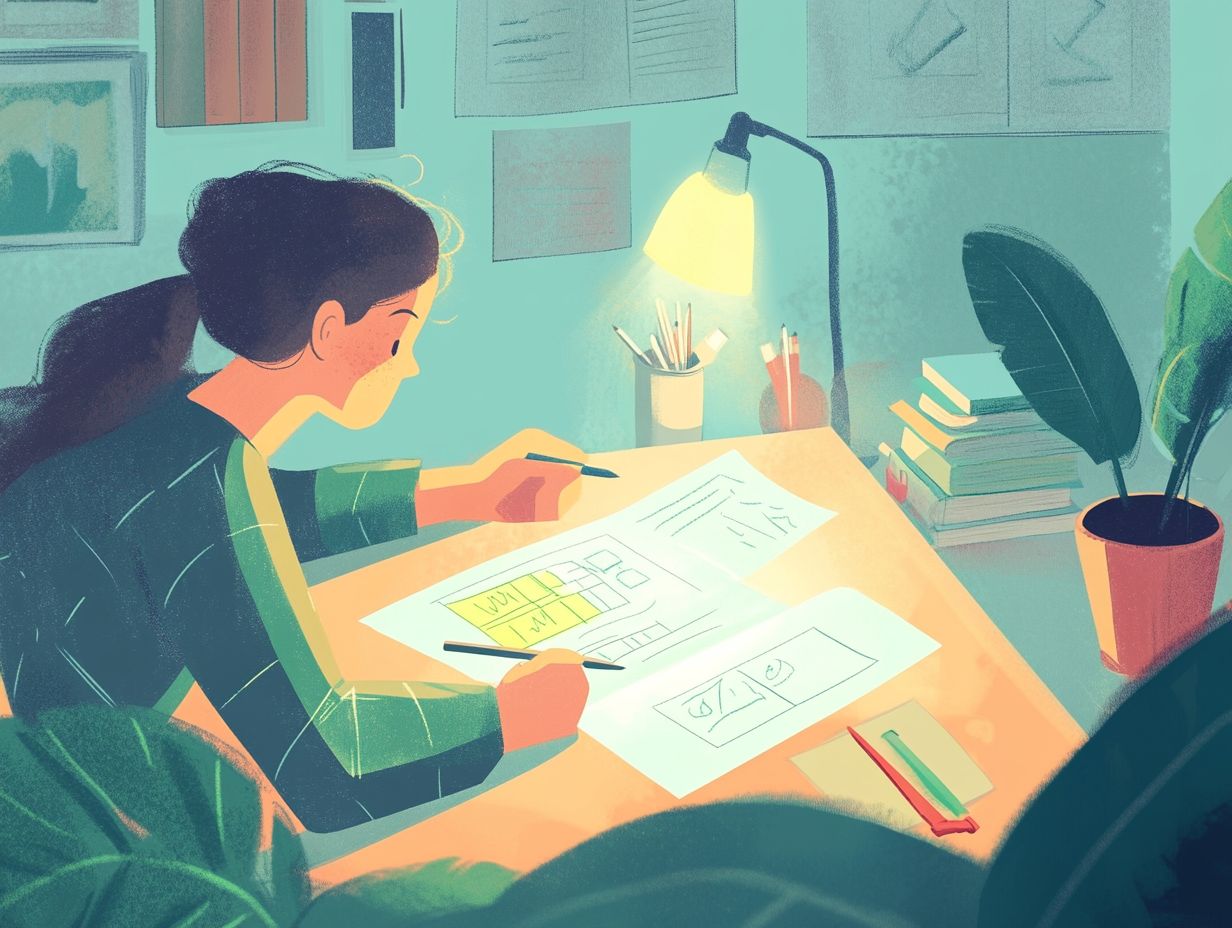
Qu es una inspecci n de vivienda y por qu es importante?
Una inspecci n de vivienda es un examen exhaustivo de la condici n de una propiedad, normalmente realizado antes de comprar o vender una casa. Es importante porque puede descubrir cualquier problema o defecto potencial en el hogar que deba ser abordado antes de finalizar la venta.
Cu les son algunos problemas comunes que se encuentran en las inspecciones de vivienda?
Algunos problemas comunes que se encuentran en las inspecciones de vivienda incluyen problemas el ctricos y de fontaneria, da os en el techo, problemas estructurales, infestaciones de moho y plagas, y peligros de seguridad.
C mo debo abordar los problemas encontrados en una inspecci n de vivienda?
El primer paso es revisar cuidadosamente el informe de inspecci n con tu agente inmobiliario y discutir cualquier preocupaci n importante. Luego, puedes negociar con el vendedor para que realice las reparaciones necesarias o proporcione una compensaci n por el costo de las reparaciones. Alternativamente, puedes optar por alejarte de la venta si los problemas son demasiado extensos.
Qu debo hacer si el vendedor se niega a abordar los problemas encontrados en la inspecci n de vivienda?
Si el vendedor no est dispuesto a realizar las reparaciones necesarias o a ofrecer compensaci n, es posible que necesites buscar asesor a legal. Tu agente inmobiliario tambi n puede proporcionar orientaci n sobre c mo proceder en esta situaci n.
Contacta a un inspector cualificado hoy mismo para asegurar que tu hogar est en las mejores condiciones.
Puedo abordar los problemas de una inspecci n de vivienda yo mismo?
Es mejor contratar a un profesional de la construcci n o a un t cnico con licencia. Ellos tienen la experiencia necesaria para evaluar y reparar los problemas correctamente.
Qu debo hacer despu s de realizar las reparaciones?
Despu s de las reparaciones, haz una reinspecci n. Esto te dar tranquilidad y asegurar que tu hogar est listo para la venta.

